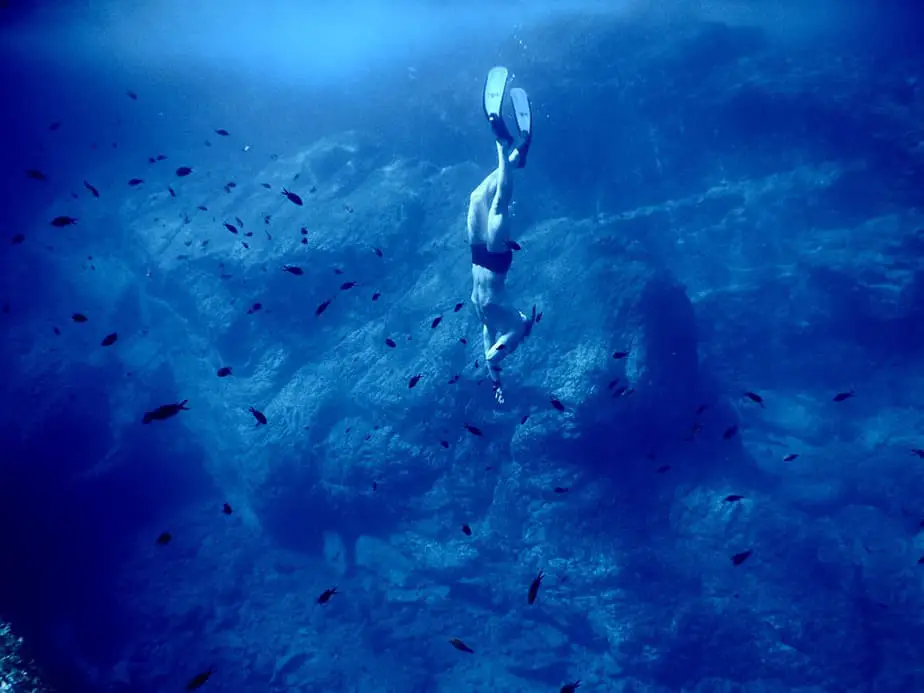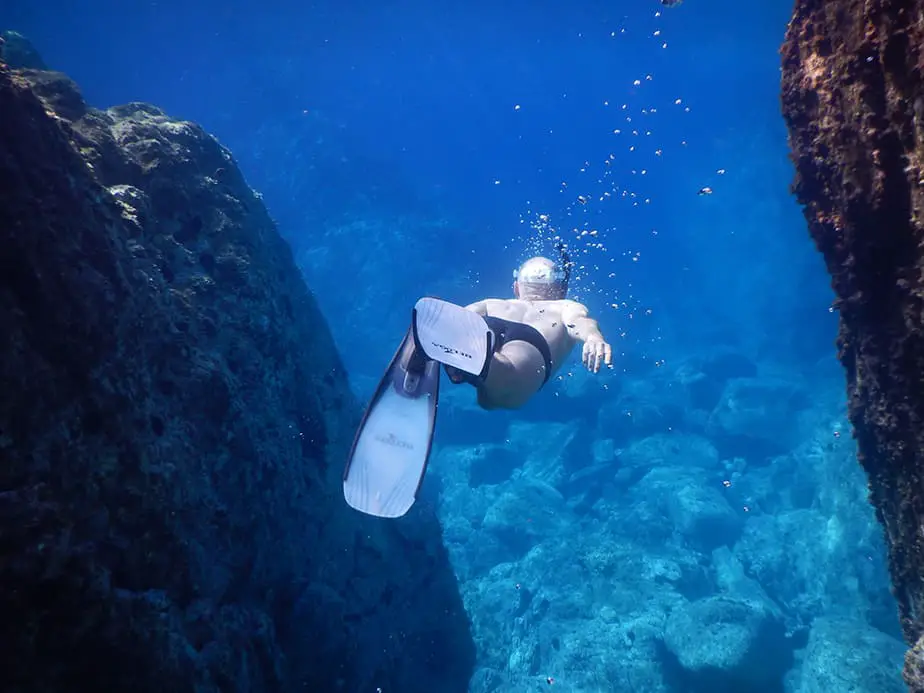Blood shift is a natural reflex that the human body automatically performs when it is exposed to intense underwater pressure. It is one of the adaptations of the mammalian diving reflex and is a physiological response to diving deep that can help you survive longer underwater.
The mammalian diving reflex is the phenomenon whereby the body automatically slows down its heart rate (bradycardia) and narrows its arteries to slow down blood flow (vasoconstriction). However, when diving deeper, two more adaptations present themselves: blood shift and the spleen effect.
Unlike vasoconstriction and bradycardia which are immediately triggered when submerged in water, blood shift and the spleen effect only occurs when there is an increase in water pressure, which all freedivers will eventually experience. Without these reflexes, freedivers would not be able to reach the incredible depths that they have without suffering tissue damage, particularly in the no-limits category.
In this article, we will discuss what the blood shift effect is and how it benefits freedivers, as well as common side effects that can occur.
How Do Freedivers Endure the Increasing Water Pressure?
As you know, the deeper one dives, the greater the water pressure they are exposed to. According to Boyle’s Law, with an increase in pressure, the volume of gas in a closed system gets compressed. In this case, the closed system is our lungs, and the gas is the oxygen within.
It is the reason why at 100 meters below the surface, our lungs will get compressed so much to the point that it is only 1/11th of its original volume.
Up until the 1960s, it was believed that it would be impossible for a human to dive deeper than 50 meters below the surface because the lung and chest cavity would become too compressed for a human to withstand.
It was believed that the rib cage would essentially fold into the empty space that the lungs would normally occupy and that the organs would be damaged by the pressure. To put it frankly, it was assumed one would die.
However, a freediver by the name of Enzo Maiorca decided to test this theory by being the guinea pig and attempting to dive further than 50 meters. He succeeded in 1961 and he survived with no injuries which baffled physiologists.
What aspect of the human physiology kept Enzo Maiorca’s rib cage from compressing and piercing his internal organs? Is Maiorca some kind of death-defying superhuman, or can his feat be replicated by other freedivers?
It wasn’t until 1974, during a study on freediver Jacques Mayol, that scientists finally found the missing piece of the puzzle: blood shift and the spleen effect.
How Blood Shift Keeps the Chest from Getting Crushed

As part of the mammalian dive reflex, due to vasoconstriction blood travels from the diver’s extremities to the organs in the chest cavity, causing them to occupy the space that the lung normally does.
But even more important than that is this little detail: blood travels to the alveoli (small sacs in the lungs where gas exchange happens) and engulfs it in blood plasma from the nearby tissues. Since blood does not compress under the water pressure it is exposed to, it will retain its volume no matter how deep the diver goes.
Since the fluid fills the empty space left behind by the air in the lung after it is compressed, the lungs and chest are not crushed by the water pressure.
The Important Role of the Spleen Effect
For a long time, physiologists thought that the spleen was basically a smaller back-up liver, performing the same function of destroying old red blood cells. Its role is non-essential; in fact, this organ can be completely removed from an individual without impacting the vital processes of the body.
However, in the context of freediving, it plays a much bigger role thanks to its secondary function. Due to the large volumes of blood that passes through the spleen, it also acts as a reservoir of blood.
When additional blood is needed for the blood shift, the spleen sends the blood into the diver’s system where it is needed. As the blood flows out, the spleen shrinks, having emptied itself of its contents.
The spleen effect can even improve the duration of long breath-holds during freedives by distributing oxygenated red blood cells throughout the body at a time when oxygen is running low.
Downsides of Blood Shift and the Spleen Effect
The spleen effect and blood shift adaptations experienced during freediving are incredible and necessary for freedivers to reach any significant depth beneath the surface, though it does not get triggered during static apnea.
As amazing as these adaptations are, they do come with a few downsides, namely immersion diuresis and a fast build-up of lactic acid.
Immersion Diuresis
Do you feel like you often have a sudden urge to pee while freediving? This phenomenon is known as immersion diuresis. Due to the increase in blood in the chest cavity caused by the blood shift, the body senses this sudden increase and removes water from blood to normalize it.
This causes rapid synthesis of urine, causing freedivers and SCUBA divers to want to pee very badly, and it also leads to rapid dehydration.
Lactic Acid
Due to the reduction of blood flow and volume in one’s extremities from vasoconstriction, lactic acid builds up faster in the limbs. This can also lead to soreness and cramps.
Training to Improve the Mammalian Diving Reflex
The mammalian diving reflex is in everybody, and it is activated automatically when submerged underwater. However, through training and stretching, it is possible to strengthen its effects and thus help improve one’s freediving abilities. Here are some ways to do so:
- Warm up and practice in shallow water first. Before diving, first exhale to decrease lung volume, and then submerge yourself. This will force the dive reflex to activate, and get the body primed for diving deep. Do not pack your lungs.
- Stretch the intercostal muscles, particularly before a freedive, to improve their thoracic elasticity and strengthen the diaphragm.
- Regularly practice freediving and gradually push yourself to reach new depths
Blood Shift Freediving Summary
The mammalian diving reflex is an important adaptation that the body has developed in response to being underwater. It includes various physiological reactions such as bradycardia (reduced heart rate) and vasoconstriction (narrowing of arteries to slow blood flow), both of which occur in shallow water.
Once a freediver reaches a depth where their lungs start to get compressed, that is when the blood shift and spleen effect kicks in. The reservoir of blood that resides in the spleen is sent out, helping to fill the space left behind by the reduced air volume and preventing further compression of the lungs.
The mammalian diving reflex is the key to humans freediving to depths previously thought unreachable. It allows us to spend longer periods of time underwater. If a freediver can improve their mammalian dive reflex response, then they can strengthen their freediving performance.

